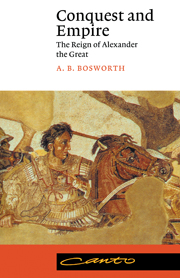3 - Epilogue: the shape of things to come
Published online by Cambridge University Press: 05 August 2012
Summary
Alexander's death led inevitably to the dismemberment of his empire. There was no immediate successor, and from the outset the marshals at Babylon had no intention of empowering a genuine king. If we may believe Curtius and Justin, their first plan was to await the birth of the child conceived by Rhoxane. Nothing guaranteed a male issue, and it was patent that the ultimate monarch would be a figurehead. The regency would be everything. This settlement with its unborn king was immediately denounced as preposterous. Incited by the phalanx commander Meleager, the infantry mutinied and pressed the claims of Arrhidaeus, Alexander's mentally deficient halfbrother. The result was a compromise. Arrhidaeus was proclaimed king, assuming the regnal name of Philip (III), and a few months later Rhoxane's child, fortunately a son, joined him in the kingship, named Alexander (IV), after his father. It was a dual kingship, as contemporary documents show, but this strange pairing of fool and infant was never more than a political expedient. The kings were the puppets of their protectors, first of Perdiccas, who became the effective guardian of the kings at Babylon and then of Antipater, who assumed the guardianship at Triparadeisus (321) and transferred the hapless rulers to Macedonia. The farce ended abruptly late in 317, when Arrhidaeus' wife, Eurydice (a granddaughter of Philip II), challenged the current guardian, Polyperchon, and attempted to enforce regal authority. She and her husband were dead within months, and the ultimate victor of the power struggle in Macedon (Antipater's eldest son, Cassander) interned the infant Alexander with his mother at Amphipolis, pointedly denying them royal privileges.
- Type
- Chapter
- Information
- Conquest and EmpireThe Reign of Alexander the Great, pp. 174 - 182Publisher: Cambridge University PressPrint publication year: 1993

